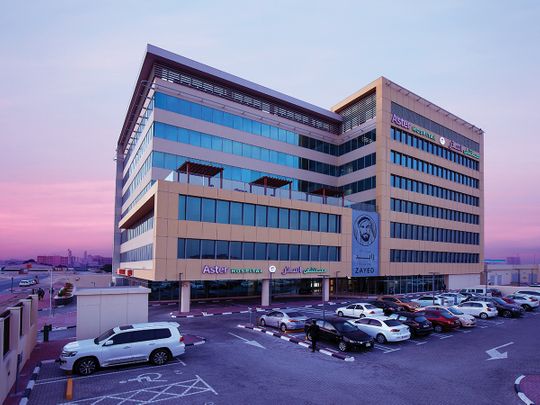
Highlight
Experts at Aster Hospital, Al Qusais talk about the occurrence of kidney diseases and how you can prevent or manage the condition better
The kidney is an important organ responsible for the filtration of waste products produced in the body. They maintain the salt and water level in your body to keep the blood pressure under control, produce red blood cells, and synthesize Vitamin D to keep your bones healthy, explains Dr Kunal Ranjit Meshram, Specialist urologist at Aster Hospital, Muhaisnah.
Risk factors
Kidney disease is defined as abnormal retention of urinary waste products in the blood, leakage of protein in the urine, and hypertension along with the damage of kidney structure. The risk factors include: diabetes, hypertension, kidney stones, voiding problems (due to bladder/prostate/ urethra problems), recurrent urinary infection, unsupervised medication intake, and family history of kidney problems.
According to Dr Abdul Hameed, specialist urologist at Aster Hospital Al Qusais, the prevalence of kidney disease is increasing worldwide. “Kidney diseases are managed by two separate specialties — nephrologists and urologists or as a team of both,” he says. “At-risk people should keep a close follow-up with the doctor to control the basic disease like diabetes, hypertension, kidney stone management, etc.”
Dr Prem Geovanni Johnson, specialist nephrology at Aster Hospital, Al Qusais, adds that you should follow your doctor’s treatment plan, including regular blood and urine tests and controlling the risk factors for the disease. “The stage of your disease will determine the course of the treatment,” he says.
Kidney patients are also advised to follow a diet called DASH (Dietary Approaches to Stop Hypertension), a diet that’s basically low in salt and moderate in potassium and calcium. It emphasizes choosing low-fat dairy products instead of high-fat ones, choosing vegetable proteins instead of animal proteins, and avoiding dark cola drinks. Be monitored for bladder infections and have them treated if you develop them. Avoid taking large amounts of painkillers, especially drugs containing a combination of caffeine, acetaminophen, and aspirin. Combination agents such as these have been associated with an increased risk of kidney disease. All these drugs can damage the inner parts of the kidneys, a condition known as interstitial nephritis. Non-steroidal anti-inflammatory drugs containing ibuprofen, as well as those containing naproxen sodium, can be harmful, but only if the kidneys are already under stress. Dehydration from overexertion can stress the kidneys. If you stay hydrated, these drugs generally are safe for the kidneys.
Dr. Hameed says that kidney disease is better managed at the primordial prevention level, by managing the risk factors. The overall management of comorbid conditions such as diabetes, hypertension, coronary heart disease is by following a healthy diet pattern, avoiding dehydration, caution with the intake of medications without supervision. Patients, more than 60 years uro-oncology, Lap-urology, reconstructive urology, and uro-gynaecology need special attention even if they do not have any comorbid conditions fighting kidney diseases.
Dr. Prem stresses that the prognosis depends upon the type and etiology of kidney diseases, “Acute kidney failure due to infection, dehydration, electrolyte imbalance, obstruction due to renal stones and prostate are reversible. Whereas Kidney failure due to immune dysfunction such as glomerulonephritis may go into remission and needs follow-up for life long,” he says. “Genetic diseases eventually lead to a chronic state, which needs long-term care, kidney disease due to comorbid conditions often have chronicity.”
Dr Kunal advises the following lifestyle changes to prevent kidney disease.
* Exercise. This doesn’t mean hitting the gym. Even walking or jogging around your neighborhood at a moderate pace will help regularly.
* Eat nutritious meals and go easy on the salt. Five to six grams of salt a day (about a teaspoon) is admissible.
* Hydrate. Drink 2-2.5 liters of water a day to help your kidneys clear sodium, urea, and toxins from the body and prevent stone formation. Drink water in regular intervals and do not postpone the urge to pass the urine for more than three to four hours.
* Quit smoking. Smoking interferes with medications used to treat high blood pressure, a leading cause of kidney disease. It also slows the blood flow to the kidneys, impairing their functioning. Smokers have a 50 per cent higher risk of developing kidney cancer.
* Limit alcohol. Kidneys filter alcohol and other harmful substances from our blood. Excess of alcohol can affect kidney health and may cause liver damage. More than seven drinks per week for women and 14 per week for men is considered heavy drinking.
* Know the risk of certain pain medications. If you have arthritis or back pain, talk to your doctor about controlling your discomfort without putting your kidneys at risk.
* Get your kidney function checked. Especially if you have one or more of the above risk factors. The early stages of CKD can be managed conservatively.
Surgical treatment for prevention of kidney diseases
Patients having kidney stones, prostate problems can be treated with medication depending upon the clinical scenario but may require surgical management if medical therapy fails. Advanced technologies are available for kidney stones and prostate problems where surgery can be done without incision over your body or keyhole surgery. Options available for kidney stones are PCNL (Keyhole), ESWL (shock waves are used), RIRS/URSL (lasers are used). The surgical approach offered depends upon the size, location, hardness of stone, and various other anatomical factors. Prostate surgery can be done without incision using TURP technique.
MEET THE TEAM OF EXPERTS
Dr Abdul Hameed, Specialist Urology, Aster Hospital, Al Qusais
Clinical Expertise — Endoscopic treatment for urinary stones, flexible endoscopy and laser treatment for urinary stones, extracorporeal shock wave lithotripsy for urinary stones, prostate surgery including laser surgery, Uro-oncology, Lap-urology, Reconstructive Urology, and Uro-gynaecology
Dr Prem Geovanni Johnson, Specialist Nephrology, Aster Hospital, Al Qusais
Clinical expertise — chronic kidney disease and hypertensive clinic, hemodialysis/ maintenance hemodialysis, post kidney transplantation follow up, glomerular diseases, and kidney biopsy.
Dr Kunal Ranjit Meshram, Specialist Urology, Aster Hospital, Muhaisnah
Clinical Expertise — Endourology, urological laparoscopic surgeries, uro-oncology, reconstructive urology (urethroplasties, ureteric reimplantation), andrology, urogynaecology.
For appointments visit www.asterhospitals.ae or call 04-4400500
















